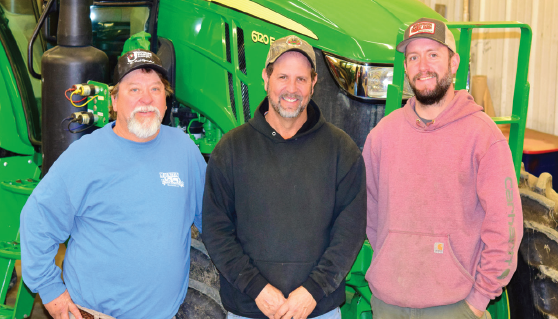Apr 25, 2022Focusing on Healthy Soils and High Yields
(Sponsored) With deep roots in agriculture, Kirby Johnson intimately understands the importance of protecting his soil’s productivity for future generations.
A seventh-generation Henderson County, North Carolina, farmer, Johnson’s ancestors were Irish potato growers. They immigrated to Virginia to farm potatoes, and later moved to North Carolina, swapping to vegetable and fruit crops. Today, the family farms in North Carolina, Georgia and Florida.

Growers.
His dad was one of 13 children, so Johnson has 52 cousins. Of those, at least 12 are involved in production agriculture, but Johnson is the only farmer in his generation. His crops include tomatoes, squash, peppers, green beans and sweet corn.
“We are limited on available land in this area, so the higher the value the crop the better,” Johnson says.
To ensure Johnson’s Mountain Bean Growers in Mills River, North Carolina, can support future generations, he is taking several steps to ensure productivity remains high while also prioritizing soil health.
One way he cares for his soil is through crop rotation. Johnson plants two years of tomatoes followed by three years of sweet corn. He has also rotated sweet corn and green bean crops in the past.
“The corn crop really builds up the soil,” Johnson says. “Rotation up here is key because tomatoes and peppers can really suck a lot out of the soil and corn does not pull those nutrients out of the ground.”
As soon as sweet corn is harvested, the field is bushhogged, which increases organic matter in the soil and improves nitrogen levels.
“The tall corn stalks are solid nitrogen,” Johnson says. “We also plant cover crops to add nitrogen to the soil and to help prevent soil erosion. I don’t want my dirt to go to Tennessee. Our cover crop holds that soil here in Mills River, North Carolina, and keeps flooding rains from eroding our soil.”
In most years, Johnson plants wheat as the primary winter cover crop. Some fields may get a rye cover crop and turnips or tillage radishes may be added to the mix to reduce soil compaction.
“We have a broad range of soil types, and each soil type has different needs,” Johnson says. “Close to the river our farmland is sandy soil, then the soil gets darker and harder as you move away from the river.”
While soil health is important to the farm’s sustainability, controlling insect pests is also critical to maintaining profitability.
“Ensuring our crops make it to market healthy and blemish-free requires a focus on thrips control,” Johnson says.
He rotates Radiant® SC insecticide with Lannate® LV insecticide to minimize costly thrips damage.
“Radiant is our premier product for western flower thrips control,” Johnson says. “But because you can’t throw only one product at them anymore, we rotate modes of action to maintain thrips control and minimize potential resistance development.”
With 100 acres of greenhouses within a mile of the North Carolina farm, Johnson is especially cognizant of crop timing. “Thrips infestations will often migrate from greenhouses into our fields,” he says.
“If we find one western flower thrips in our tomato or pepper crops, we start spraying. If you find one, you can guarantee there are more out there you won’t find,” Johnson says. “Thrips get down in that bloom and hide from you. Thrips damage the tomato or pepper when the bloom is the size of a ballpoint pen, and it will carry that damage all the way through the season.”
Johnson and his team continue monitoring insect pest populations throughout the season to determine if subsequent sprays are needed.
“We also rely heavily on the advice and expertise of the experts at North Carolina State University at their Mills River, North Carolina, research station,” Johnson adds.
Find out how Radiant can help you reach your yield goals. Visit RadiantSC.Corteva.US.
™ ® Trademarks of Corteva Agriscience and its affiliated companies. Lannate® LV is a Restricted Use Pesticide. The EPA-registered label for Lannate LV contains the following statements: “This product is highly toxic to bees exposed to direct treatment on blooming crops or weeds. Do not apply this product or allow to drift to blooming crops or weeds if bees are foraging in (actively visiting) the treatment area.” Lannate LV is not registered for sale or use in all states. Contact your state pesticide regulatory agency to determine if a product is registered for sale or use in your state. Always read and follow label directions.
© 2022 Corteva. CA14-358-027 (05/22) BR CAAG1INTE054
















